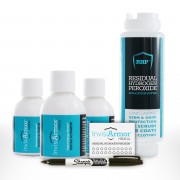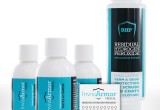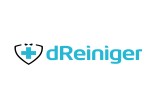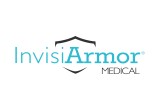Introducing: InvisiArmor® Medical Residual Hydrogen Peroxide™ Technology for Textiles

Charlotte, NC, March 29, 2016 (Newswire.com) - dReiniger LLC announces the launch of its first family of infection prevention products for healthcare; the InvisiArmor Medical© Residual Hydrogen Peroxide™ Textile Activator, Application Bottle, and tagging system. This newly patented formulation and application process for textiles is a breakthrough technology that will raise the standard of “clean” for healthcare professionals by prolonging the antimicrobial power of hydrogen peroxide on scrubs, lab coats and other healthcare work clothes and textiles. In addition, Residual Hydrogen Peroxide™, one of the most environmentally friendly and effective residual antimicrobials available today, can be applied repeatedly at home. This enables workers to treat their own uniforms and thereby continuously protect themselves, their families, their patients and the community, while also contributing to their health system’s antimicrobial stewardship.
The InvisiArmor Medical line has been designed specifically for healthcare professionals, to help mitigate the dangers of daily exposure to highly infectious pathogens. The process involves combining InvisiArmor Medical© Textile Activator with a bottle of 3% hydrogen peroxide (readily available in any drug or grocery store) to make Residual Hydrogen Peroxide™ (RHP). Once applied to clothing following the instructions for use, RHP remains effective for up to 20 launderings. Clothing tags are attached to the treated items to monitor the number of launderings and assure appropriate reapplication.
"Residual Hydrogen Peroxide is a breakthrough technology that offers unprecedented peace of mind for those that find themselves in high threat contaminated environments."
Jeffrey D. Robinson, CEO
Healthcare-acquired infections cause significant morbidity and mortality, and result in considerable costs to healthcare systems worldwide. In the United States, approximately 1.7 million nosocomial infections cause or contribute to 99,000 deaths each year, typically from severe infection of the urinary, respiratory or gastrointestinal tracts or from bacteremia and severe sepsis. These infections are often difficult to treat and are often caused by antibiotic-resistant organisms such as MRSA, VRE and ESBL.
The most common route of transmission of nosocomial infection is by direct contact with healthcare workers or contaminated surfaces within a healthcare facility. Such surfaces include hospital textiles and healthcare worker clothing, which can serve as fomites, or sources of microbe colonization. Strict enforcement of prevention protocols such as glove use, hand and surface hygiene, and removal of “unnecessary" items of healthcare worker clothing (neck ties and long sleeves, for example) has helped to reduce this problem. However, the latest CDC HAI Progress Report (http://www.cdc.gov/hai/surveillance/progress-report/index.html) indicates that “Despite progress, more action is needed at every level of public health and health care to eliminate infections that commonly threaten hospital patients...”, and that “On any given day, approximately one in 25 US patients has at least one infection contracted during the course of their hospital care, demonstrating the need for improved infection control in US healthcare facilities.”
Application of RHP has been shown, even after 20 launderings, to significantly reduce the viable biological load on clothing, including MRSA and other antibiotic-resistant organisms. Using a standard AATCC 100 test protocol, laboratory results have shown a Log 5 reduction (99.999%) of MRSA for up to 20 launderings.
This new RHP formulation works by impregnating clothing with hydrogen peroxide that has been rendered residual - that is, resistant to degradation by washing and everyday use. Hydrogen peroxide has been proven to reduce infection rates and reduce the risk of infection in hospital environments. Furthermore, 3% hydrogen peroxide is safe on contact with skin and degrades into water and oxygen after disposal, making it environmentally friendly.
By reducing the bioburden within a healthcare worker’s personal space, healthcare professionals can significantly reduce the risk of transmitting infection via this vector to the patients and colleagues with whom they come into contact during the workday. If an RHP treatment program is initiated throughout a healthcare facility, this protection can be extended to further reduce the risk of nosocomial infections and their related costs and consequences. It can also provide peace of mind for healthcare workers and patients, and for families and friends who are exposed to healthcare textiles inside and outside the hospital setting.
About dReiniger LLC
dReiniger LLC researches, develops and sells proven infection-prevention products that reduce the risk of cross- contamination from high-touch textiles and surfaces in healthcare, fitness and other work environments. Intensive science and research supports every InvisiArmor® Medical formulation and technology, to assure antimicrobial efficacy and practical use. For more information on the products and the science, please visit www.invisiarmor.com.
###


